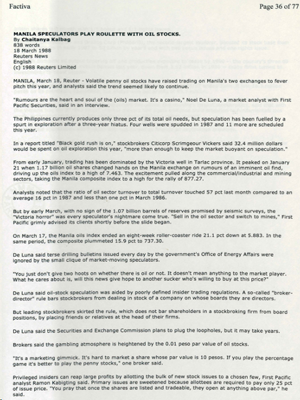MANILA SPECULATORS PLAY ROULETTE WITH OIL STOCKS
[Reuters]
Published date: 18th Mar 1988
18 March 1988
Reuters News
English
(c) 1988 Reuters Limited
MANILA, March 18, Reuter – Volatile penny oil stocks have raised trading on Manila’s two exchanges to fever pitch this year, and analysts said the trend seemed likely to continue.
“Rumours are the heart and soul of the (oils) market. It’s a casino,” Noel De Luna, a market analyst with First Pacific Securities, said in an interview.
The Philippines currently produces only three pct of its total oil needs, but speculation has been fuelled by a spurt in exploration after a three-year hiatus. Four wells were spudded in 1987 and 11 more are scheduled this year.
In a report titled “Black gold rush is on,” stockbrokers Citicorp Scrimgeour Vickers said 32.4 million dollars would be spent on oil exploration this year, “more than enough to keep the market buoyant on speculation.”
From early January, trading has been dominated by the Victoria well in Tarlac province. It peaked on January 21 when 1.17 billion oil shares changed hands on the Manila exchange on rumours of an imminent oil find, driving up the oils index to a high of 7.463. The excitement pulled along the commercial/industrial and mining sectors, taking the Manila composite index to a high for the rally of 877.27.
Analysts noted that the ratio of oil sector turnover to total turnover touched 57 pct last month compared to an average 16 pct in 1987 and less than one pct in March 1986.
But by early March, with no sign of the 1.07 billion barrels of reserves promised by seismic surveys, the “Victoria horror” was every speculator’s nightmare come true. “Sell in the oil sector and switch to mines,” First Pacific grimly advised its clients shortly before the slide began.
On March 17, the Manila oils index ended an eight-week roller-coaster ride 21.1 pct down at 5.883. In the same period, the composite plummeted 15.9 pct to 737.30.
De Luna said terse drilling bulletins issued every day by the government’s Office of Energy Affairs were ignored by the small clique of market-moving speculators.
“You just don’t give two hoots on whether there is oil or not. It doesn’t mean anything to the market player. What he cares about is, will this news give hope to another sucker who’s willing to buy at this price?”
De Luna said oil-stock speculation was aided by poorly defined insider trading regulations. A so-called “broker director” rule bars stockbrokers from dealing in stock of a company on whose boards they are directors.
But leading stockbrokers skirted the rule, which does not bar shareholders in a stockbroking firm from board positions, by placing friends or relatives at the head of their firms.
De Luna said the Securities and Exchange Commission plans to plug the loopholes, but it may take years.
Brokers said the gambling atmosphere is heightened by the 0.01 peso par value of oil stocks.
“It’s a marketing gimmick. It’s hard to market a share whose par value is 10 pesos. If you play the percentage game it’s better to play the penny stocks,” one broker said.
Privileged insiders can reap large profits by allotting the bulk of new stock issues to a chosen few, First Pacific analyst Ramon Kabigting said. Primary issues are sweetened because allottees are required to pay only 25 pct of issue price. “You pray that once the shares are listed and tradeable, they open at anything above par,” he said.
Analysts said despite the high risks, ordinary holders of oil shares also benefitted from occasional bonanzas.
Oriental Petroleum and Minerals Corp, the largest oil producer, increased its stock base three-fold to 37.5 billion shares last month with 1: 1 bonus and 1: 1 rights issues.
Philippine Overseas Oil and Drilling Corp (Philodrill), the second-largest explorer, boosted its stock base from 10 billion shares in early 1987 to 50 billion by year’s end with two bonus issues and one rights issue.
But with domestic oil output tapering off and production expected to cease by 1990 — the country’s three oil wells produced only 2.02 million barrels last year, down from 2.52 million in 1986 — many firms turned to investments to boost income.
Philodrill’s investment portfolio provided 88 pct of its revenues in 1986/87 ended June. It lost 16.3 million pesos on its petroleum operations, but ended with net profits of 95.7 million.
Rolando Atienza, President of Anscor Hagedorn Securities, the country’s largest stockbrokers, said that with the Victoria bug out of their blood, market players had again switched their attention to fundamentals this week, prompting recovery in the commercial/industrial and mines sectors.
He also said speculation was healthy and had helped to finance oil exploration activities.
“As long as a market allows you to raise risk capital, it’s economically productive. This market prefers riskier companies with higher returns,” he said.






